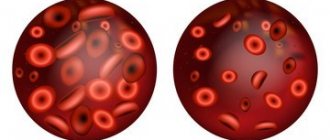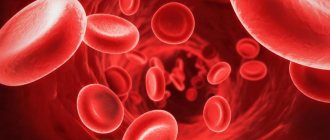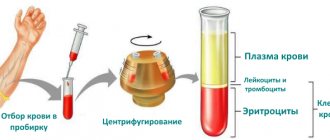Potassium levels in the blood exceeding 5.3 mmol/l are a dangerous condition for the human body.
This disorder is called hyperkalemia . The diagnosis is made to a tenth of patients who were hospitalized in hospitals in medical institutions in serious and extremely serious condition.
Elevated potassium in the blood: what does it mean, and why is a high level in plasma serum dangerous, what are the reasons?
The development of diseases of the urinary system (oliguria, anuria), changes in the functioning of the nervous system, disruption of synaptic mechanisms, acute renal or liver failure, general intoxication of the body, changes in water-salt balance (dehydration) are common causes of intracellular ion imbalance.
Causes of high potassium in the body
The cell charge is provided mainly by potassium ions
Potassium is one of the most commonly found macronutrients in the body; every living cell of the body carries dissolved potassium ions that help it maintain the electrical potential on its outer membrane necessary for functioning.
We can figuratively compare the role of potassium in the body to the “filling” of a battery, while the majority of ions should be contained in the intracellular fluid; according to various sources, about 97-98% of potassium is concentrated there. Potassium is normally contained in the blood in fairly small quantities - 3.51 - 5.1 mmol/l (data may vary depending on the laboratory method used).
Adrenal pathology may affect potassium levels
Pathologically high amounts of potassium can enter the blood for a number of reasons:
- After an extensive burn, fracture, injury, as well as after severe operations. In this case, massive damage to the body’s cells plays a direct role: they are destroyed and their contents, which contain large quantities of potassium, come out. The substance quickly enters the blood, so a laboratory test can detect an increase in potassium already a couple of hours after cell death.
- Malfunction of the kidneys. It is the kidneys that are responsible in the body for the removal of most electrolytes (“salts”); when their tissue is damaged by infection, an autoimmune or tumor process, the blood composition very quickly begins to suffer. If the kidneys are damaged, potassium levels can reach life-threatening levels.
- Lack of production of hormones from the adrenal cortex. The adrenal glands can also suffer from infection (bacterial or viral) or be affected or compressed by a tumor; in rare cases, potassium may be elevated due to Addison's disease.
- Diabetes of the first or second type, accompanied by deterioration of the condition - acidosis. This is most often observed with dangerously high blood sugar values; in this case, an increase in potassium reflects the severity of the pathological process.
- Impaired respiratory function of the lungs. It can be a consequence of acute or chronic bronchitis, pneumonia, chronic obstructive pulmonary disease (COPD) and many other conditions.
Diabetes mellitus is a possible cause of hyperkalemia
The most common causes of increased potassium include kidney disease and endocrinological disorders, as well as taking high doses of potassium in the form of medications, treatment with drugs that reduce the excretion of potassium from the body.
Treatment
The causes of increased potassium in the blood can be dangerous diseases that require specific treatment. At the same time, the patient is prescribed mineralocorticoid therapy and a low-potassium diet.
The main procedures that help regulate the operation of all systems include the following activities:
- If the patient has taken medications containing this element, they should be discontinued immediately.
- To protect the heart muscle, 10% calcium gluconate is administered in a dose of 10 ml. This method solves many causes of increased potassium in the blood. Any doctor can tell what this means for the patient, since an improvement in the condition should appear within 5 minutes, and this is very fast, and last up to an hour. The doctor sees such changes in the ECG diagram. If nothing happens, the procedure is repeated.
- Insulin is used together with glucose to direct potassium ions into the cells, thereby lowering its content in the plasma.
- You can also administer exclusively glucose, which stimulates the production of endogenous insulin and helps lower the mineral. However, this process is quite lengthy, so it is not suitable for a quick solution to the problem.
- Adrenergic stimulants and sodium bicarbonate are often used to move potassium. The last component from the list is undesirable to use in chronic renal failure, as there is low efficiency and a serious threat of overloading the body with sodium.
- Thiazide and loop diuretics, as well as cation exchange resins, are excellent for removing potassium.
- Hemodialysis is considered one of the most effective methods for quickly reducing severe hyperkalemia. This option is used when all methods have shown ineffectiveness and for patients with acute and chronic renal failure.
Symptoms and signs of high potassium levels
Fading of the heart may accompany hyperkalemia
A high level of potassium in the body may not manifest itself for a long time until the concentration reaches numbers several times higher than normal values. The first signs of increased potassium, as a rule, are general malaise, weakness, dizziness and headaches. As the condition worsens, the following most often appear:
- Disturbances in the functioning of the heart - may be accompanied by a feeling of “freezing” in the chest, interruptions in heart rhythm, and insufficient heart rate even during exercise. At rest, severe bradycardia will be observed - a low number of heartbeats per minute - less than 50.
- Indigestion - the most pronounced is nausea and prolonged lack of appetite; in severe cases, periodic vomiting may occur.
- Unusual sensations in the muscles - lethargy, a feeling of constant weakness, tingling of the skin.
- Cramps or numbness of the limbs, facial muscles.
- Rapid breathing, severe shortness of breath even at rest.
- Fainting or attacks of dizziness.
Indications and preparation for potassium analysis
Arterial hypertension - indication for analysis
Indications for analysis are:
- Kidney pathology - glomerulonephritis, pyelonephritis, any conditions associated with decreased urine production;
- Endocrinological diseases - diabetes of the first and second types, Addison's disease, hypoaldosteronism;
- Disturbances in the functioning of the cardiovascular system - any types of arrhythmias, bradycardia, arterial hypertension;
- Conditions after major operations, injuries or burns;
- Tumor processes of any localization.
Potassium levels are needed to monitor the effectiveness of treatment
In addition, potassium levels must be monitored during treatment:
- Diuretics (diuretics);
- Non-steroidal anti-inflammatory drugs (painkillers);
- Cardiac glycosides;
- Medicines to lower blood pressure (captopril, enalapril, lisinopril and others).
Preparation for the analysis consists of following a diet - before the study, you must stop overeating on fatty foods, 8-9 hours before the test, you should stop eating, and you can drink water. 1-2 days before the study, intense physical activity and sports are excluded.
What are the dangers of high potassium levels?
Arrhythmias may be caused by hyperkalemia
High potassium levels primarily reduce impulse conduction at neuromuscular junctions and between individual muscle fibers. The human heart is a single muscle with four chambers, which works like a pump due to its contractions; with an increase in potassium levels, the contractile function of the heart begins to be inhibited very quickly, and with increasing concentration, muscle weakness increases.
The heart turns out to be unable to eject blood into the arteries with the necessary force and beats at the right time; its individual sections begin to contract rarely and randomly.
When potassium levels rise to extremely high levels, cardiac arrest or fibrillation may occur.
Factors causing falsely high potassium levels
Physical activity the day before the test can affect the result
The main reasons for inaccurate analysis results include:
- Severe physical strain, especially accompanied by muscle pain, 1-2 days before donating blood;
- Excessive fasting before analysis (more than 12-13 hours);
- Insufficient amount of water taken the day before the test - you need to drink at least 1.0-1.5 liters of liquid, depending on the season;
- Taking medications containing potassium shortly before donating blood (asparkam, panangin and others);
- Failure of medical personnel to comply with standards for blood collection and transportation.
False Positives
The reasons for changes in potassium levels in a biochemical blood test can be true or false. The results of a laboratory examination may be false positive in the following cases of violation of the rules for drawing blood from a vein:
- applying a tourniquet to increase blood pressure in a vein for a long time;
- puncture of a vein during puncture;
- collecting material immediately after administering potassium preparations to the patient;
- non-compliance with the rules for storing blood samples;
- the patient has conditions in which platelets in the blood and leukocyte cells increase in the vascular bed;
- the patient has a history of genetic diseases that are characterized by persistently elevated levels of potassium in the blood plasma.
Correction of potassium levels
Diet is also important in correcting hyperkalemia
Correction of potassium levels at elevated levels should begin with the abolition of potassium-containing drugs - vitamin complexes, dietary supplements and other drugs. If possible, you should also exclude foods that contain excess potassium: dried fruits, apples, spinach, pumpkin, legumes, bananas.
Further therapy is prescribed by the attending physician in accordance with laboratory test data and the patient’s condition. In cases where potassium in the blood is slightly increased, it may be sufficient to prescribe a special group of diuretic drugs (furosemide, mannitol), which stimulate the kidneys to excrete potassium more intensively. In case of severe disturbances in the functioning of the heart, intravenous administration of calcium supplements is most often prescribed; if the condition worsens, hemodialysis is performed.
Diagnostic methods
Before prescribing treatment to a patient with symptoms of hyperkalemia, a comprehensive examination is carried out to find out why this ratio has increased. Even if, for example, a biochemical blood test reveals that the indicator is too high, all the necessary diagnostic methods will still be carried out. The same applies to an ECG recording with signs of hyperkalemia.
The first step is to donate blood again, as sometimes the results can be false. This occurs when the biomaterial collection technique is incorrect (prolonged application of a tourniquet or untimely examination of a blood sample). Then the concentration of K in the urine is determined. If there are signs of diseases of the urinary system, then the values can reach or even exceed 30 mmol/l.
An ECG is performed or another film is taken again to confirm suspected changes in heart rhythm. If K is significantly higher than normal - more than 7 mmol/l, a rapid test is performed, which allows you to see a more complete picture of the patient’s condition. It is used to estimate the amount of cations in the serum, including ionized calcium.
Additionally, the doctor may prescribe a blood test for calcitonin, a thyroid hormone that controls calcium metabolism. This is sometimes necessary to make a primary diagnosis and helps to track changes in electrolytic as well as water-salt metabolism. Only passing all the necessary examinations will ensure an accurate diagnosis and the development of effective therapeutic tactics.
Preventing high potassium levels
Balanced diet - prevention of electrolyte abnormalities
Normally, blood contains the main macroelements in stable proportions: potassium, sodium, magnesium and calcium in dissolved form. All these components are equally important for maintaining the functioning of internal organs; with an inadequate increase in any of them, a relative “deficiency” of the remaining components is observed, since the balance is disturbed. Prevention of elevated potassium levels consists of maintaining the entire electrolyte composition of the blood at the proper level; the following should be supplied to the body daily with food:
- Calcium - found in large quantities in dairy products, sesame, almonds, poppy seeds, rose hips, parsley.
- Magnesium - in bran, buckwheat, pine nuts, halva, peanuts, chickpeas, walnuts.
- Sodium - found in table salt.
- Potassium - in dried fruits and dried vegetables, legumes, wholemeal bread, soybeans, dried mushrooms, spinach and other greens.
Diet
The recommended diet for a hyperkalemic state involves limiting the consumption of foods with a high content of this cation:
Fresh fruits and vegetables should be in your daily diet
- exclusion of salt and sugar substitutes from the diet. These products contain high concentrations of potassium. You should opt for dietary supplements containing magnesium;
- among grains, preference should be given to products such as bread, pasta, rice;
- introduce fresh fruits and vegetables into your daily diet;
- Among meat products, it is advisable to consume poultry and eggs.
A significant reduction in potassium in products is ensured by cooking them in unsalted water.
Compliance with medical recommendations regarding drug therapy and dietary nutrition can prevent a critical increase in potassium levels in the blood plasma and the development of severe complications.











